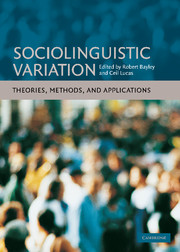Book contents
- Frontmatter
- Contents
- 1 List of figures
- 2 List of tables
- Acknowledgments
- Notes on editors and contributors
- Introduction
- Part 1 THEORIES
- Part 2 METHODS
- Part 3 APPLICATIONS
- 12 Sociolinguistic variation and education
- 13 Lessons learned from the Ebonics controversy: implications for language assessment
- 14 Variation, versatility, and Contrastive Analysis in the classroom
- 15 Social-political influences on research practices: examining language acquisition by African American children
- 16 Sociolinguistic variation and the law
- 17 Attitudes toward variation and ear-witness testimony
- Afterword: Walt Wolfram and the study of sociolinguistic variation
- References
- Index
12 - Sociolinguistic variation and education
Published online by Cambridge University Press: 16 February 2010
- Frontmatter
- Contents
- 1 List of figures
- 2 List of tables
- Acknowledgments
- Notes on editors and contributors
- Introduction
- Part 1 THEORIES
- Part 2 METHODS
- Part 3 APPLICATIONS
- 12 Sociolinguistic variation and education
- 13 Lessons learned from the Ebonics controversy: implications for language assessment
- 14 Variation, versatility, and Contrastive Analysis in the classroom
- 15 Social-political influences on research practices: examining language acquisition by African American children
- 16 Sociolinguistic variation and the law
- 17 Attitudes toward variation and ear-witness testimony
- Afterword: Walt Wolfram and the study of sociolinguistic variation
- References
- Index
Summary
Introduction
Improved understanding of, and sensible approaches to, linguistic and cultural diversity in society are increasingly critical to promote equity and respect, particularly in schools and workplaces, for members of all groups in our society. Language is a core element, both in real differences and in the symbolic proxy it provides for other social parameters, such as ethnicity. Headlines in recent years on hot issues such as Ebonics and bilingual education demonstrate the widespread misunderstanding of the underpinnings of those educational issues and of language in general. While scholars understand many of the linguistic principles underlying variation in language and multilingualism in society, the many educational and social issues that arise in connection with diversity remain significant challenges.
Better information and understanding of how language works and how people learn languages is sorely needed. Myths and misconceptions about language pervade public discourse and underlie policy decisions at all levels, and those knowledgeable about language need to be involved in those conversations. These issues were underscored by a panel convened by the National Science Foundation to consider the development of human capital, identifying research questions for the future and potential areas for contributions from linguistics (Wolfram and Schilling-Estes 1996b). The panel set its premise as follows:
Given the cognitive basis of the human language faculty and the sociocultural context in which language use is embedded, linguistic investigation has played and should continue to play a central role in advancing our basic understanding of the effective utilization of human capital. (1996b:1)
- Type
- Chapter
- Information
- Sociolinguistic VariationTheories, Methods, and Applications, pp. 237 - 253Publisher: Cambridge University PressPrint publication year: 2007
- 3
- Cited by



